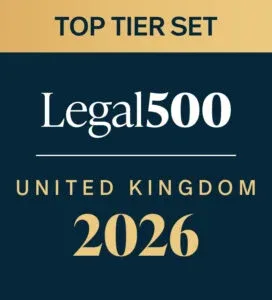- All Barristers
- Robin Kitching
Robin Kitching specialises primarily in Professional Discipline as well as Inquests and General Crime.
"Robin has an extremely sensible head. He looks at a problem in a way you don't always at first see. He always gives a third option that you wouldn't have thought of."
Chambers and Partners, 2026
Notable Cases
-
R v W - Dangerous Dogs Act case.
Instructed on behalf of the owner of a retired police dog (S) who had become involved in a fight with another dog (C) and then bitten C’s owner badly (several days in hospital skin graft operations necessary).
There were factual issues between the parties such as which dog was the initial aggressor but the complainant’s dog, C, had not bitten anyone (nor had he bitten S). The offence is one of strict liability so required no fault on the part of W.
Not guilty verdict in front of a District Judge who was not sure of the account of the complainant. The main basis for the acquittal, however, was a legal submission that there was no act or omission on the part of the defendant which had a sufficiently causative effect on the incident for criminal liability to arise. Case of R v Pierre-Robinson relied upon.
-
GDC V Dr PS
Registration Appeal
The case involved a dentist who had qualified in a non-EU country and after qualification had practised for a number of years both abroad and in the UK.
He ceased practice approximately 10 years ago in order to qualify as a doctor which he has done. He wished to progress in his chosen field of oral and maxillofacial surgery but found that dual registration with the GDC was necessary so he reapplied for GDC registration. He has no intention of practising again as a dentist. His application was refused on the basis of the age of his dental qualifications and lack of recent experience. The GDC’s position was that that meant he could not demonstrate the “requisite skills and knowledge” demanded by the Dentists Act. The GDC did, however, acknowledge that his qualification was a “recognised overseas diploma” for the purposes of the Act. The case centred on consideration of the arcane complexities and legal interpretation of Article 34 of “Directive 2005/36/EC of the European Parliament and of the Council of 7 September 2005 on the recognition of professional qualifications” and sections 15 and 16(2)(2A) and (2B) of the Dentists Act.
-
Inquest Re: CT
Inquests
Represented a care home (Warrington coroner's court).
Resident with MS refused food and treatment but was deemed by a psychiatrist to have sufficient mental capacity to make his own decisions and admission to a psychiatric unit was not appropriate because he didn't have sufficiently significant mental health issues.
He died in a very poor physical state.
-
Inquest touching upon the death of Levi Smith.
Inquests
Representing a prison officer in an Article 2 jury inquest. The officer had care of the deceased (LS) overnight in the segregation unit of HMP Elmley. LS was on hourly observations (following the opening of an ACCT) but was later found hanging in his cell. The evidence from CCTV footage showed the observations of the deceased which should have been conducted by the officer in question had not been carried out adequately (and in some cases not at all). The coroner was persuaded that the failings of the officer were not such as could be said to have contributed more than minimally etc to the death.
The inquest ran for 3 weeks.
-
L. NHS teaching hospitals v Dr B
Professional Discipline
Represented a Dr at a disciplinary hearing in which it was alleged that he sexually abused a patient during the course of 2 hospital consultations. Dr B was exonerated of any wrongdoing.
-
Inquest touching upon the death of BK
Inquests
A two week article 2 jury inquest following a death in custody (suicide) at HMP Leeds. Acting for GeoAmey who had been responsible for the transportation of BK to and from Leeds Magistrates’ Court and whilst in the cells there. The inquest focused on whether GeoAmey and HMP Leeds (including healthcare) had adequately responded to warnings about BK’s risk factors. Ultimately no criticisms were made of GeoAmey or any of their employees who were found to have followed correct procedures and had passed on the information in their possession to the prison.
-
GMC v Dr S Robinson
Professional Discipline
Sexual relationship with a patient. Involving issues of abuse of process/admissibility of covert tape recordings.
-
GMC v Sharief
Professional Discipline
Research fraud during significant trials relating to MS.
-
R v P
Crime
Represented the elder of 2 brothers charged with sexually abusing a foster sister over a period of 2 years in the early 1990s. The defendant was aged 18 – 20 at the time of the alleged offences and the complainant aged 12 – 14. The defendant’s father had kept meticulous farming diaries of the years in question and by careful cross referencing of the diaries against the allegations it was possible to demonstrate that the complainant’s account could not be true. Defendant was acquitted.
-
R v C
Crime
Represented a defendant who was charged with the rape of a woman with whom he lodged. He claimed that he had been drugged by her and could recall nothing of the evening in question but denied rape. He accepted taking drugs and alcohol himself before the incident. Despite legal arguments, the defendant’s previous conviction for rape (on a different complainant) was adduced and he was convicted but did not receive a life sentence. Appeal currently in progress.
-
R v H
Crime
Represented a defendant in a 9 day trial in relation to numerous counts on the indictment, relating to allegations of a 27 year campaign of rape against his wife. Other counts included assault by penetration (and ABH x 3. All charges denied, though many of the acts alleged were admitted. The defence was that his wife had consented to all acts performed upon her, and he was Acquitted on all counts.
-
R v JW (and another)
Crime
Represented a defendant who was charged (along with co-defendant) with allegation of rape. Both defendant and co-defendant were aged 17 at the time of the incident, the complainant was aged 15. The defendant suffered from autism and ADHD. Both defendants accepted that they had had sexual intercourse with the complainant (within a few minutes of each other) in a tent. The Defence was consent; the prosecution alleged that the complainant was too drunk to consent. He defendant also maintained that he believed the complainant was over 15. A Defence expert was called to give evidence about the defendants various deficiencies and the impact of those matters on issues such as reasonable belief in consent, ability to assess the level of another person’s intoxication etc. Defendant was acquitted.
-
R v M
Crime
Represented a defendant (aged 24 and of good character) who faced allegations of rape of his female cousin on a fortnightly basis over a period of 6 or 7 years from when she was aged 7 to when she was aged 13 (and he was aged 11 - 17). Thereafter it was alleged that the abuse continued until she was 15. In the aftermath of the complaint the defendant had sent text messages which were highly damaging, indeed the prosecution relied upon them as admissions. After a 5 day trial the defendant was acquitted of all 16 counts on the Indictment.
-
R v S
Crime
Represented a 48 year old defendant who was alleged to have raped his niece 13 years earlier (when she was aged 12). The matter had been reported to the police twice before and investigated but never pursued. All documents relating to those accusations and CPS charging decisions had been lost. The defendant was acquitted.
-
R v MR (and another)
Crime
Defendant was charged with child cruelty. His 5 week old stepdaughter sustained a badly displaced fracture of the femur. The prosecution expert witnesses said the injury was non accidental but the prosecution could not prove which defendant had caused the injury. The case was therefore put on the basis that the child would have experienced such excruciating pain when the injury occurred and whenever the leg was moved that the defendants must have known she required medical treatment. The defendants accepted knowing that there was something wrong with the child's leg but not that it was seriously injured. There was a delay of at least 7 hours before medical help was sought. R was acquitted.
-
R v Ping Lin and others
Crime
Serious money laundering (arising out of the production of drugs).
-
R v Automart online Ltd and others
Trading Standards
Trading Standards case involving several defendants and thousands of allegedly fraudulent transactions involving members of the public (Indictment stayed as an abuse of process).
Appointments
- CPS Advocates Panel - Cat 4
- GMC Panel of Advocates
Professional Associations
- Northern Circuit
- Criminal Bar Associations
Education
- BA (Hons) History; Victoria University of Manchester
- Inns of Court School of Law










